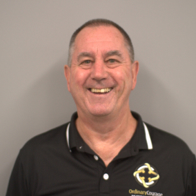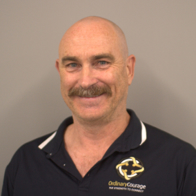Trigger warning: Some people have had firsthand experience with bushfires, and reading about them may cause stress. This article contains historical details about bushfires.
When it comes to bushfires, few Australians have seen and experienced as much as Jim Smith. The veteran volunteer firefighter and former Deputy Commissioner of Fire and Rescue NSW has been on the front line of every major fire emergency in his state from 1980 to today, including the deadly Black Summer fires of 2019 and 2020.
“You’ll never know what it’s really like to have that 20-metre wall of fire coming at you until it happens.”

“There’s so much smoke the sun disappears. It gets really quiet, and all of a sudden, you just hear this noise as the fire comes towards you. It sounds like several steam trains coming towards you.
“There are embers everywhere, landing down your neck, making holes in your fire gear, and all that noise. It’s a very, very confronting scene if you haven’t been there before. That’s why knowing how to prepare for a bushfire mentally is just as important as preparing your home.”
What to expect during a bushfire
Stress and worry are a normal response to bushfire season, especially if you’ve been impacted before.1 While Jim advises that preparing your property well and leaving early should always be your primary goal in a bushfire emergency, circumstances may lead to you being caught in or near a bushfire or forced to stay and shelter at your home.
By knowing what to expect, you can be emotionally prepared and able to stay calm and focused when it counts.2 Here are some of the things you might experience during a bushfire:3
- Intense heat and darkness.
- The sky turning orange.
- Strong gusty winds that impair hearing and movement.
- Thick smoke that stings your eyes and could make it hard to breathe.
- Flying embers that could spark spot fires.
- Power, water and internet being cut off.
- Nearby explosions or the roar of approaching fire.
- Hours of time spent on alert before you can rest.
- Isolation.3
Why it’s important to build mental resilience
Climate change is increasing the strength and prevalence of bushfires globally and in Australia, and that means bushfires will potentially impact more of us in future.4
“Climate change also means that our approach to fire prevention needs to evolve, and an important part of that change is boosting our mental resilience,” says Mark Dobson, long-serving firefighter and volunteer team manager at Disaster Relief Australia.
In a high-stakes fire emergency, research has shown that being mentally prepared could make all the difference to your chances of survival.2
During the catastrophic Black Saturday bushfires of February 2009, 173 Victorians lost their lives. A subsequent study of 103 survivor accounts from the 2009 Victorian Bushfires Royal Commission found that 33 had survived conditions so adverse that they could have died.2
The study suggests that, despite facing physical distress and extreme danger, these 33 people were able to survive due to their ability to maintain their mental focus and take action.2
These findings underline the important role that both mental resilience and goal-oriented behaviour can play in determining survival outcomes during a bushfire.2
Practising your bushfire survival plan
Another key resilience strategy is having a well-thought-out bushfire survival plan that you and your household members have practised. Becoming more familiar with your plan will make it easier to act automatically, even under extreme stress, and could increase your chances of survival.5
“I think there’s a direct link between practical preparation and psychological preparation.”

“If you’ve already thought about what could go wrong, and what you need to do, and what you need to take with you, that’s less to worry about when the bushfire front hits and you have to do lots of things really quickly. You’ll have that extra capacity to make more complex decisions.”
Ways to manage stress
Most of us find we are unable to think clearly when experiencing severe stress. However, the calmer you are in an emergency, the better equipped you’ll be to respond appropriately.6 Some steps you can take to manage stress include:5
- Breathe slowly and engage in positive self-talk
- Acknowledge that it’s okay not to be totally calm
- Focus on what needs to be done
- Stick to your bushfire survival plan
- Check on family or neighbours
- Listen to emergency service advice on the radio
- Keep emergency numbers handy.5
“Take a deep breath, know your plan and lead your family through it as each situation occurs,” advises Jim. “Panic will only lead to poor decisions.”
How to prepare children for bushfires
Fire risk and prevention are important topics to discuss with your kids, taking care to do so in a way that doesn’t negatively impact their sense of safety and security. Here are some tips that you might like to consider to help prepare your children for bushfires:7
- Talk to them in an open, supportive and age-appropriate manner.
- Include them in creating your bushfire survival plan.
- Involve them in physical preparations and include them when rehearsing your plan.7
“A good method to involve children is to give them specific tasks in your bushfire survival plan,” suggests Mark.
“Give them small jobs and get them packing a bag, making a checklist of things to be done around your property, practise packing the car, and so forth.”
Connect with your community
“Building closer ties with your neighbours and community is another effective way to improve your bushfire resilience and can really improve outcomes,” adds Jim.
“Ask your local fire station to come around to your street and talk to your neighbours about your bushfire risk and how best to prepare,” he suggests.
“A well-prepared community is safer than just one well-prepared property.”

Useful resources for bushfire preparation
Looking for more information on fires and mental health? You may find these resources helpful:
- NSW Health – Managing your mental health during and after a bushfire8
- Australian Red Cross – Prepare your mind6
- Children’s Health Queensland – Birdie and the fire9
- Better Health – Talking to children about bushfires7
- SA Country Fire Service – Preparing yourself mentally & physically5
For more expert tips to help you get bushfire ready, visit our you.prepared emergency content hub.
Jim Smith & Mark Dobson
With a combined firefighting history of more than 60 years, Jim Smith and Mark Dobson are leading members of Australia’s firefighting community. Their experience encompasses major bushfire events, including the Canberra Bushfires in 2003, Black Saturday in 2009 and the Black Summer fires of 2019-20. The pair now work together in their respective roles as General Manager and Founder of Ordinary Courage, a consultancy dedicated to providing organisations with the tools to sustain good workplace mental health. Youi is proud to partner with Jim and Mark in the creation of this bushfire preparedness content.
The content in this article has been prepared based on current government and emergency services guidelines and expert advice provided at the time of publishing. This information is subject to change. Please be sure to check for the latest information and always consider your personal circumstances regarding bushfire preparedness and response.
Where you have increased your cover or reduced your excess within 72 hours (or other period noted on your policy schedule) of a flood, storm, hail or bushfire occurring, cover will be limited to the amount that was effective prior to the change. Loss, damage or legal liability caused by, resulting or arising from flood, storm, hail or bushfire during the first 72 hours (or other period noted on your policy schedule) of your policy first being purchased is excluded unless certain conditions apply. Refer to the relevant PDS, TMD and your policy schedule for full T&Cs.
1 Source: Better Health – Bushfire preparation advice, December 2022
2 Source: Australian Institute for Disaster Resilience – “Deep Survival”: Experiences of some who lived when they might have died in the 7 February 2009 bushfires
3 Source: Queensland Fire Department – Will you stay?, June 2024
4 Source: University of Tasmania – Extreme bushfires increasing in number and intensity, June 2024
5 Source: SA Country Fire Service – Preparing yourself mentally & physically
6 Source: Australian Red Cross – Prepare your mind
7 Source: Better Health – Talking to children about bushfires, December 2022
8 Source: NSW Health – Managing your mental health during and after a bushfire, April 2024
9 Source: Children’s Health Queensland – Birdie and the fire, October 2023






